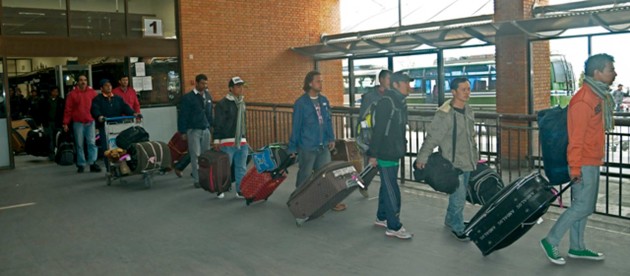Internal issues crucial for reaping more from labour migration
 Mahendra Subedi / Kathmandu : Nepal marked the International Migrants Day on Friday by praising the migrant workers who toil all day long in the foreign land, to help their family back home, while also making significant contribution to the nation’s economy.
Mahendra Subedi / Kathmandu : Nepal marked the International Migrants Day on Friday by praising the migrant workers who toil all day long in the foreign land, to help their family back home, while also making significant contribution to the nation’s economy.
The United Nations’ International Migrants Day is observed on December 18 every year to recognize the efforts, contributions and rights of migrants worldwide. It is also celebrated in commemoration of the adoption of the International Convention on the Protection of the Rights of All Migrant Workers and Members of Their Families from the UN in 1990.
Though Nepal is not a party to the Convention, it has been celebrating this day since 2006 to express its solidarity with the world’s governing body in ensuring various kinds of welfare to the migrants.
In Nepal, labour migration has emerged as an important issue in the recent decades contributing as an important factor in shaping demographic upheavals and bringing changes in economy, sociological and cultural fabric. According to national census, 2011, the number of absentee population has reached nearly 2 million with as high as 60 per cent of the country’s total households with labour migrants.
Labour migration has also significantly contributed to the country’s economy. The country received Rs 617.28 billion in remittance– nearly one third of the country’s GDP–through the banking channel in the last fiscal year, according to the Nepal Rastra Bank (NRB). However, the remittances could be fairly large in size if the amount coming from the illegal channel basically Hundi were calculated. Besides, foreign employment has also become a notable mode of bringing in foreign exchange to the country.
Including a large portion of undocumented migrants, the number of labour migrants is believed to have crossed 2.5 million while India still hosts the largest number of Nepali workers, mostly seasonal ones from the mid and far west districts. However, no exact number of Nepalis working in India is available because of Nepal’s porous border and no visa system for Nepalis in India.
Following the current suit, the number of Nepali migrant workers is likely to increase in the Gulf Nations in the coming years mainly because of the ongoing construction boom there and Qatar hosting the FIFA World Cup-2022. Altogether 110 countries are open for foreign employment for Nepalis.
Despite the big picture in the name of labour migration, this sector is full of woes and oddities, thanks to apathy of government and other stakeholders, mostly the recruiting agencies. Nepal receives generally three dead bodies of the migrant workers either from the Gulf Nations and Malaysia while equal numbers of other Nepalis are wounded aboard for their ‘dirty’, ‘dangerous’ and ‘degrading’ works every day. Furthermore, the Nepali migrant workers are fleeced by their fellow countrymen running recruiting agencies and training centres right from the pre-recruitment stage.
Experts say that the women domestic migrant workers and other undocumented workers are more vulnerable. Chief of Economic Empowerment Programme at UN Women Nepal, Sharu Joshi Shrestha suggested that standard terms of contract should be introduced from the labour receiving countries to ensure the better status of the domestic migrant workers. She underscored the need for advocacy at national, regional and international level for the same.
The key challenge since the beginning of the foreign employment is to making this sector systematic, decent, professional and worker-friendly.
Chairperson of Paurakhi Nepal, Manju Gurung, termed the current status of the labour migration sector as pathetic. “Unsafe migration has increased. Activities of middlemen have shot up. ‘Setting’ continues unabated at the Tribhuvan International Airport (TIA), increasing the vulnerability of the aspirant migrant workers,” she said.
Gurung also lamented that the government has given less priority to the labour migration. We don’t have Labour Minister and the management system within the ministry is also messy.
Meanwhile, Joshi however lauds Nepal’s National Plan of Action for Safe Migration, terming it a progressive move in the entire Asia Pacific Region. She however emphasized on its sincere implementation. Despite challenges, a consolidated data system should be developed to facilitate the reintegration packages of the returnees to help engage them at home, Joshi of UN Women says.
Likewise, Paurakhi Chair Gurung bats for access to credible information, effective orientation and decentralised mechanism for issuing labour permission to the aspirant migrant workers as well as strong monitoring from the government agencies. “Government agencies should work honestly for management and regulations to avoid wrongdoing and ensure safer migration of the workers,” she said.
As the nation continues to benefit significant from the labour migrants, the state needs to launch labour welfare programmes to protect the rights of the workers and resolve the labour disputes by creating a tripartite mechanism of government, employees and workers.
Furthermore, skill enhancement would be a better tool to reap more income for the migrants and the ministries, CTEVT and other vocational training centres could work in a coordinated fashion for it.
As a result, making the recruiting agencies more responsible, relevant changes in the government policy as well as providing due emphasis to labour diplomacy in the major destination countries, mostly the Gulf Nations and Malaysia, could be better option to rid the foreign employment sector of anomalies and aberrations. RSS
